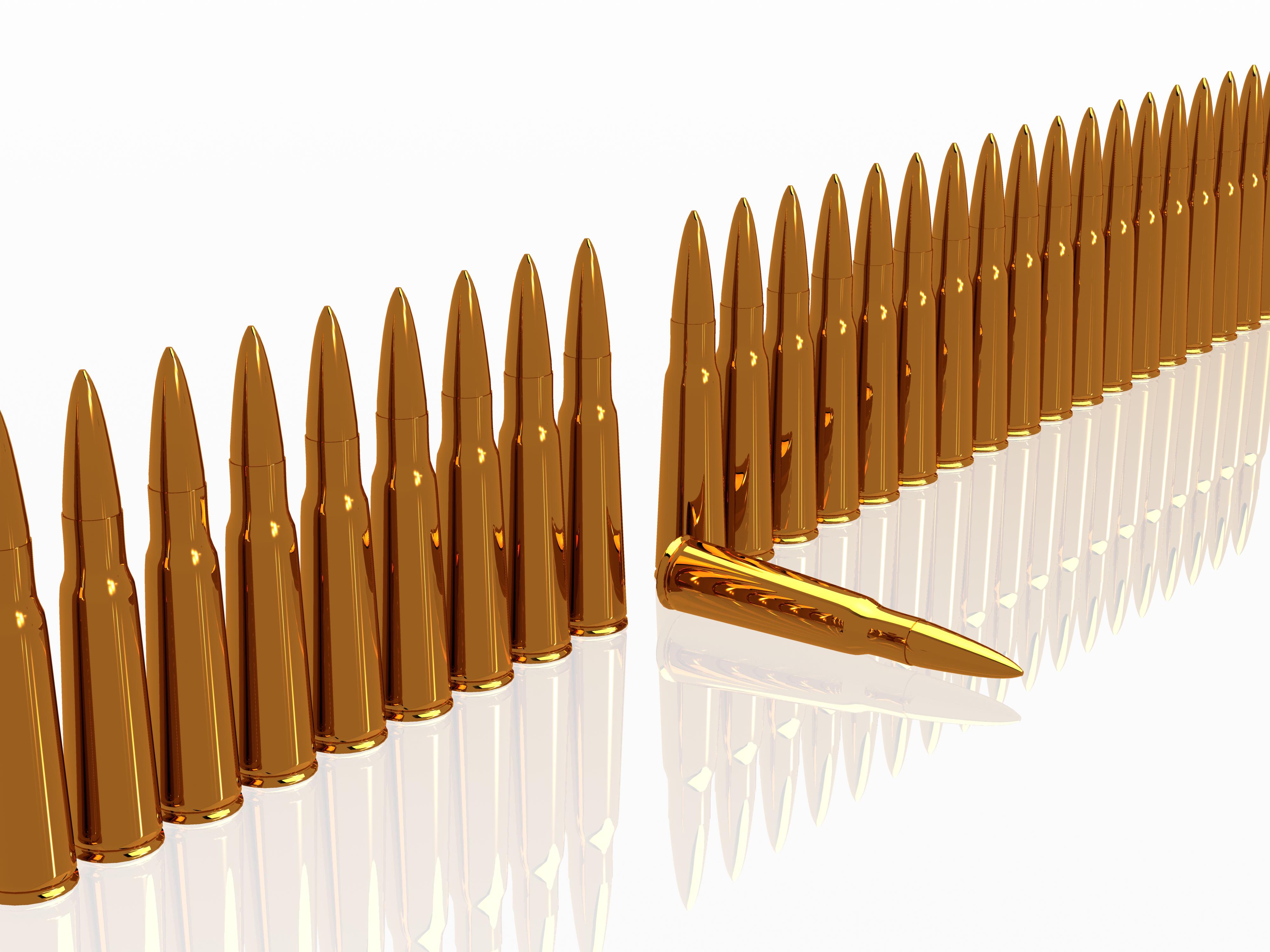How to smash the gun lobby
Time to name and shame the people who make bank off dead Americans


A free daily email with the biggest news stories of the day – and the best features from TheWeek.com
You are now subscribed
Your newsletter sign-up was successful
Twelve people are shot in Chicago every day on average. The victims enter the rolls of the city's more than 500 homicides (the overwhelming majority of them shooting deaths), thousands of injuries, and vast webs of families and communities shattered by gun violence in 2016 alone.
I think a lot about Chicago's guns because I live next door; the country thinks a lot about them because "Chicago" has become shorthand for a kind of context-less chaos we fear lies just beyond our front step (where "our" means [mostly] white, middle-class news consumers). Furthermore, it's easier to wring our hands over Chicago than it is to grapple with the much larger, national truth: Even with its growing homicide rate, the city represents a small percentage of America's 33,000 annual firearms deaths — nearly two-thirds of which are neither mass shootings nor individual crimes but, in fact, suicides.
Thirty-three thousand is about the same number of people who live in Bozeman, Montana; three times the population of Sedona, Arizona; 10 times the population of Provincetown, Massachusetts. Every year — every single year — we accept the violent deaths of an entire town's worth of Americans. Why?
The Week
Escape your echo chamber. Get the facts behind the news, plus analysis from multiple perspectives.

Sign up for The Week's Free Newsletters
From our morning news briefing to a weekly Good News Newsletter, get the best of The Week delivered directly to your inbox.
From our morning news briefing to a weekly Good News Newsletter, get the best of The Week delivered directly to your inbox.
Are we heartless? Surely not — our constant grief tells me we're more often heartbroken. Are we ignorant? Maybe we were once (and I suspect most Americans still don't realize how many gun deaths are self-inflicted), but in these post-Sandy Hook, post-Orlando, post-Chiraq days, most of us possess at least a passing awareness of the issue (witness the majority of Americans who want more gun control legislation, not less.) And don't tell me it's the Second Amendment. The Constitution is and was always intended to be a living document — you can't yell "fire!" in a crowded theater, the three-fifths clause is null and void, and the 21st Amendment is as real as the one it repealed.
Poverty, racism, unchecked crime, and a pervasive culture of toxic masculinity all play key roles in the deadly churn; improved mental health services would surely save many potential suicide victims. But the foundation upon which our annual slaughter rests is one simple fact: The gun industry is exactly that — an industry.
Gun manufacturers don't make up some kind of Second Amendment honor guard. They are businesses that profit handsomely from the fear and bloody mayhem that they promote and facilitate. People make bank off dead Americans.
Gun control advocates have spent years calling on the better angels of our neighbors and politicians; we've compiled statistics and formulated Constitutional arguments; we've launched buy-back programs and conflict interventions and suicide hotlines — and each has garnered certain successes and (and this is not trivial, because where there is life, there is hope) saved lives, but none of it has worked in any larger, fundamental sense. Thirty-three thousand annual deaths later — 22,000 annual suicides later — we need to hit the gun industry and its supporters where it hurts: their wallets.
A free daily email with the biggest news stories of the day – and the best features from TheWeek.com
I am aware — painfully, excruciatingly aware — that this sounds naïve, or maybe just impossible. An $8 billion industry that wraps itself in the flag and pliant politicians is neither a small nor an easy target. About a third of the American public has already handed over their money; the election of a black man was enough to send gun sales through the roof, and each new massacre brings another spike. There are already 300 million-some-odd guns in circulation, legally or not.
It won't be easy — but we can start. We have to start. We can name and shame industry leaders like Michael Fifer (CEO of the baldly political Ruger) alongside the politicians who enable them, like Indiana governor and vice presidential candidate Mike Pence, people who profit either literally or politically from a business model that peddles death. We can start questioning the millions of dollars that the NRA's top executives share in salaries and other compensation in exchange for leading one of the nation's most powerful "nonprofits." Corporations, universities, and influential figures can start actively divesting from the industry, citing concerns that employees'/clients'/students'/fellow citizens' lives not be endangered by their investments; individuals can make the effort to be sure that we aren't inadvertently invested in the gun business, either.
In the meantime, we dare not abandon any of our other efforts to mitigate the appalling toll the firearms industry exacts. Even if a massive divestment campaign were launched tomorrow, none of the Chicagoans killed this year will be returned to their families.
But we have to start. The blood and anguish of our fellow citizens has been monetized and exploited long enough. We must start the process of making death a bad business to be in.
Emily L. Hauser is a long-time commentary writer. Her work has appeared in a variety of outlets, including The Daily Beast, Haaretz, The Forward, Chicago Tribune, and The Dallas Morning News, where she has looked at a wide range of topics, from helmet laws to forgetfulness to the Israeli-Palestinian conflict.
-
 Crisis in Cuba: a ‘golden opportunity’ for Washington?
Crisis in Cuba: a ‘golden opportunity’ for Washington?Talking Point The Trump administration is applying the pressure, and with Latin America swinging to the right, Havana is becoming more ‘politically isolated’
-
 5 thoroughly redacted cartoons about Pam Bondi protecting predators
5 thoroughly redacted cartoons about Pam Bondi protecting predatorsCartoons Artists take on the real victim, types of protection, and more
-
 Palestine Action and the trouble with defining terrorism
Palestine Action and the trouble with defining terrorismIn the Spotlight The issues with proscribing the group ‘became apparent as soon as the police began putting it into practice’
-
 The billionaires’ wealth tax: a catastrophe for California?
The billionaires’ wealth tax: a catastrophe for California?Talking Point Peter Thiel and Larry Page preparing to change state residency
-
 Bari Weiss’ ‘60 Minutes’ scandal is about more than one report
Bari Weiss’ ‘60 Minutes’ scandal is about more than one reportIN THE SPOTLIGHT By blocking an approved segment on a controversial prison holding US deportees in El Salvador, the editor-in-chief of CBS News has become the main story
-
 Has Zohran Mamdani shown the Democrats how to win again?
Has Zohran Mamdani shown the Democrats how to win again?Today’s Big Question New York City mayoral election touted as victory for left-wing populists but moderate centrist wins elsewhere present more complex path for Democratic Party
-
 Millions turn out for anti-Trump ‘No Kings’ rallies
Millions turn out for anti-Trump ‘No Kings’ ralliesSpeed Read An estimated 7 million people participated, 2 million more than at the first ‘No Kings’ protest in June
-
 Ghislaine Maxwell: angling for a Trump pardon
Ghislaine Maxwell: angling for a Trump pardonTalking Point Convicted sex trafficker's testimony could shed new light on president's links to Jeffrey Epstein
-
 The last words and final moments of 40 presidents
The last words and final moments of 40 presidentsThe Explainer Some are eloquent quotes worthy of the holders of the highest office in the nation, and others... aren't
-
 The JFK files: the truth at last?
The JFK files: the truth at last?In The Spotlight More than 64,000 previously classified documents relating the 1963 assassination of John F. Kennedy have been released by the Trump administration
-
 'Seriously, not literally': how should the world take Donald Trump?
'Seriously, not literally': how should the world take Donald Trump?Today's big question White House rhetoric and reality look likely to become increasingly blurred
